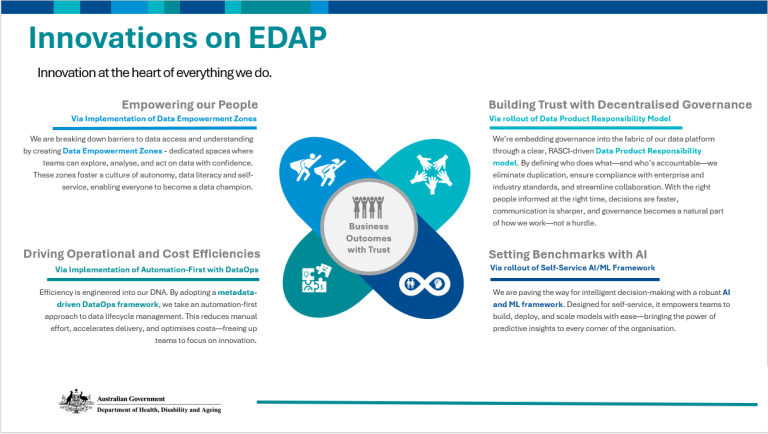Empowering teams to innovate responsibly with AI
Project summary
Health, Disability and Ageing is innovating with AI to improve its services and operations. In 2024, the department implemented a new cloud-based platform called the Enterprise Data and Analytics Platform.
The platform consolidates the department’s data assets from a range of internal sources on a single repository. It is delivered through Google Cloud Platform’s BigQuery service, an autonomous data to AI platform that automates the data life cycle.
The Enterprise Data and Analytics Platform makes it possible for different teams across the department to independently access self-service analytics, enabling non-technical users to create, train and deploy machine-learning AI models with ease.

Innovations using Vertex AI on the Enterprise Data and Analytics Platform, delivered through the Google Cloud Platform.
Image: Health, Disability and Ageing
How AI contributes to the project
The department's advanced analytics capabilities, powered by Google Cloud, are undergoing significant enhancements to support machine-learning initiatives.
Historically, the department relied on legacy on-premises tools to build machine-learning models. While these tools met business need, they resulted in ongoing training costs, resource allocation, suboptimal performance, and ongoing sustainment expenses.
Now on a transformational journey to address these challenges and revolutionise how to approach machine learning, the department is taking advantage of advanced analytics to introduce an innovative low-code/no-code, self-service capability.
This capability will empower Health, Disability and Ageing to build and train machine-learning models at a fraction of the current cost, with minimal to no technical skills required, and predictable ongoing expenses.
Additionally, a centralised registry of AI and machine-learning use cases enhances transparency and fosters collaboration, with model sharing across business units set to accelerate innovation and efficiency across the department.
This project represents a significant leap forward and is set to deliver benefits to the department and those it serves.
Outcomes and next steps
This project’s use of low-code/no-code features is empowering more users, particularly those who are not data scientists, to successfully train and deploy machine-learning models.
Operational efficiencies are being achieved through reduced dependency of business areas on the central IT team for machine-learning experimentation and deployment. Accelerated time-to-value gains are being realised through reusable patterns and automated data ingestion pipelines.
The project is aligned to the AI operationalisation work program supporting a cultural shift within the department by increasing AI literacy and enabling digital innovation.
Health, Disability and Ageing’s AI operationalisation processes, and the Enterprise Data and Analytics Platform infrastructure, align with the whole-of-government AI policy, Ethics Principles and Assurance Framework. They are reusable across government and being shared with other agencies for adoption.



